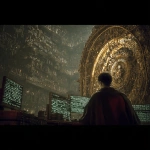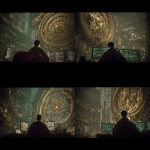Explore the Best AI Image Gallery

AI-Generated Media: A New Frontier in Creativity and Ethics
The digital landscape is constantly evolving, and one of the most exciting and potentially disruptive advancements is the rise of AI-generated media. From text to images, music to video, artificial intelligence is now capable of creating content that was once thought to be exclusive to human imagination. This new frontier presents a wealth of opportunities for the creative industry, but it also raises a host of ethical questions that demand careful consideration.
The Potential of AI-Generated Media
AI-powered tools have the potential to revolutionize various aspects of the creative process:
- Content Creation: AI can generate text, images, music, and video content at an unprecedented speed and scale. This opens up possibilities for personalized experiences, rapid prototyping, and the creation of entirely new forms of media.
- Enhanced Creativity: AI can act as a creative assistant, providing inspiration, suggesting ideas, and helping artists overcome creative blocks. It can also enable experimentation with novel concepts and styles.
- Democratization of Creativity: AI-powered tools can empower individuals without specialized skills or resources to create high-quality content. This can lead to greater diversity and inclusion in the creative landscape.
Applications Across Industries
The impact of AI-generated media is already being felt across diverse industries:
- Marketing and Advertising: AI can generate personalized ad copy, create dynamic visuals, and even produce short video ads tailored to specific audiences.
- Entertainment: AI can be used to develop interactive storylines, generate realistic characters for games, and create immersive virtual reality experiences.
- Education: AI-powered tools can personalize learning materials, generate interactive simulations, and provide real-time feedback to students.
Ethical Considerations
While the potential benefits of AI-generated media are vast, it is crucial to address the ethical concerns that accompany this technology:
- Copyright and Ownership: Questions arise regarding the ownership of AI-generated content. Who holds the copyright—the creator of the AI, the user who prompts it, or the AI itself?
- Bias and Discrimination: AI algorithms can perpetuate existing biases present in the data they are trained on. This can result in discriminatory or unfair outputs that reinforce societal stereotypes.
- Misinformation and Deepfakes: The ability to create realistic synthetic media raises concerns about the spread of misinformation, propaganda, and the potential for malicious use.
- Job Displacement: AI-powered tools may automate certain creative tasks, potentially leading to job losses in the creative industry.
Navigating the Future
The emergence of AI-generated media presents both tremendous opportunities and complex challenges. To harness its potential while mitigating the risks, it is essential to:
- Develop robust ethical guidelines and regulations:** Frameworks are needed to address issues of ownership, bias, transparency, and accountability in the development and use of AI-generated media.
- Promote education and awareness:** It is crucial to educate the public about the capabilities and limitations of AI, as well as the potential ethical implications.
- Foster collaboration and dialogue:** Open discussions among stakeholders—creators, technologists, policymakers, and the general public—are essential to shape the future of AI-generated media in a responsible and beneficial way.
As AI technology continues to advance, the creative landscape will undoubtedly be transformed. By embracing ethical considerations and fostering collaboration, we can ensure that AI-generated media serves as a powerful tool for innovation, expression, and human progress.

](https://images.ai-img.art/thumbnails/150/69daab74527edc292198788487e2d0d5f1bb1aba897d85b79ff4015ea305631d.webp)








](https://images.ai-img.art/thumbnails/150/8fd5788e152269ccc7eeb4a5287499cc5f55ca46d75afc237030f50a1b60c6ca.webp)

](https://images.ai-img.art/thumbnails/150/786d3898a4574da9c53e922bd2a30035084a90a9a6f5cc6bee514d0150ba3403.webp)










](https://images.ai-img.art/thumbnails/150/7889b264cc5c27f6b7a00af1767a689c9df2b49d36667764d8322ae0c0fed64a.webp)








](https://images.ai-img.art/thumbnails/150/24ccaad8968bce75611aa4ff739695d61b7d06bd128d44cfbb3a6c46be30ed33.webp)













](https://images.ai-img.art/thumbnails/150/0d2c5ff24ca9024b95b5f0d1d0e673146e5dd5f31c7b3a7092322afe4a3c46eb.webp)


